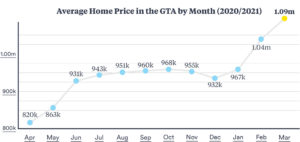
As winter melts into spring, the pandemic rages on and the average price of a home in the GTA (and beyond) continues on its upward trajectory, it’s easy to feel overwhelmed by everything going on around us.
We’re here to offer you clarity amidst the chaos. We’re taking a look at the state of the real estate market this month and offering some insight to help you navigate it and make wise decisions.
The banks can’t seem to agree
Every single major Canadian news source has been reporting on the state of the real estate market and the alleged “bubble” we’re experiencing; And while most people can agree that there’s a problem, it seems that no one can agree on the best course of action to deal with said problem.
The banks and senior economists don’t seem to be immune from this uncertainty.
RBC believes that the government should step in and change policy on a number of fronts to get the housing market in order. They are suggesting a multifaceted approach is best practice, including: removing regulations and zoning restrictions that add a burden to builders and developers with the intention of increasing supply, tightening mortgage lending rules ensure Canadians aren’t being over-burdened by mortgage debt and potentially phasing-out mortgage interest expense tax-deductibility for investors to discourage speculative buying.
Scotiabank, on the other hand, believes that the currently inflated prices will encourage more sellers to come to the market, and help even out pricing. They feel that any government intervention would be unwise at this time.
Obviously, just like Realtors, the financial institutions don’t have an army of psychics on staff. We will just have to wait and see what the future holds for the real estate market, but here’s what the government COULD do to slow market growth: They could introduce a capital gains tax on principal residences, tax speculative buying, or make changes to the mortgage stress test.
So, what did the government actually do?
Truthfully, not a whole lot.
A 1% vacant home tax for foreign buyers was introduced, which was probably intended to reduce speculative buying, but from what we’ve learned from the Vancouver market, where a similar (higher) tax already exists, is that this probably won’t do much to dissuade foreign investors.
An additional $2.5B has been committed to the existing 10-year, $70B affordable housing strategy. This is great news for low income Canadians, but probably won’t have much effect on the market as a whole.
Homeowners will be able to apply for interest-free loans up to $40k through CMHC to retrofit existing homes to make them more green. A win for the planet, but again, not anything noteworthy for the market as a whole.
Over asking, Overblown
Don’t believe everything you read.
If Toronto for sale signs were to be believed, you’d get the impression that everything sells above and beyond anyone’s expectations every time. And, while it’s true that a lot of homes in the city sell above the asking price, not everything is as it seems.
You see, as an industry, we’ve gotten ourselves into a bit of a predicament. In some areas, buyers expect everything to go over the list price– lookin’ at you, Leslieville– and, it’s been this way for the better half of a decade. So, we have to under ask, because when homes in these areas are priced at their market value, it’s assumed that they’re expected to go even higher, and they don’t sell as quickly, as easily, or for as much money. That’s bad news for our sellers, so to a certain degree, underpricing is usually the best move we can make for our clients.
In these “hot” neighbourhoods we, as agents, have learned to adjust our pricing and marketing strategies accordingly. We set offer dates and do prelisting inspections to set ourselves up for a multiple offer situation. This helps us avoid the need for inspection clauses on offers. When you have 10+ offers, there may be a few people willing to do an inspection before the offer date, but others may just walk away.
All that said, when most of these homes sell “over asking”, they aren’t generally selling above their market value or above and beyond the listing agent’s expectations– they’ve just been underpriced to drum up interest. Obviously, there are exceptions to this. And, there are times when the market is particularly hot, or a property will set a sales record that we weren’t expecting, but that’s the exception, rather than the rule.
How to buy in a competitive market
If you’re a buyer right now, the state of the market probably seems pretty intimidating. Prices are at an all time high, the condo market is making a serious comeback, and competition is fierce.
Luckily for you, navigating the chaos of bidding wars, low inventory, high demand and bully offers is what our team member Vanessa does best. In the last months, she’s had great success helping her clients buy homes in spite of the chaos and competition. She’s here to give us her tips:
—
In a market with low inventory and lots of hungry buyers you have to move fast. I like to think of it as being “knowledgeably quick”. In this situation there’s little room for error, and a successful buying agent will have to:
1. Know exactly what their clients want & need
AKA not just a talker, but a great listener too. Our job is to filter out the distractions and point our clients in the direction of potential properties that will ACTUALLY suit their needs, so when a great opportunity comes up, we can jump on it without hesitation.
2. Have the full, undoubting trust from their clients
See above. If I don’t have the full trust of my clients, I have to spend time we don’t always have convincing them that I know what I’m talking about. Establishing trust from the get go, means that I can spend less time talking someone into a purchase and more time helping them get what they want.
3. Understand a property’s worth before opening the door
You have to know the market and your product. That means being able to look at a listing and know what it’s worth and what its potential is. That also means knowing how to do your research. A home may look good on paper, but what about the street it’s on? The building it’s in? It’s important to know what you’re walking into before you spend valuable time going to see it. This is the reason we don’t venture too far outside of our preferred areas. We believe that our biggest value to our clients is our expert level knowledge of the market, and when we go too far outside those areas, that value is compromised.
4. Build a quick rapport with the selling agent
When there are 10+ offers on the table, the best thing you can do for your client is getting the listing agent in your corner. When they empathize with you and your client, they’re more likely to make your case to their seller.
5. Negotiate over hesitate
No place is going to be “perfect”. That’s not to say that you should settle, because you absolutely shouldn’t. But if a great home needs a new roof, for instance, that needs to become part of your negotiation at offer time, rather than a reason to freeze and potentially miss out on an otherwise great opportunity.
To summarize: try to be the first person into view a property and the first to put in an offer. Know it’s value before you get there and know when to walk away.
And in the words of Limp Bizkit….”Rock, gotta have faith”.
—
If you are planning to make a move and you want to get Vanessa or another member of the SO&Co.team in your corner shoot us a message. We’d be happy to sit down for a chat.








